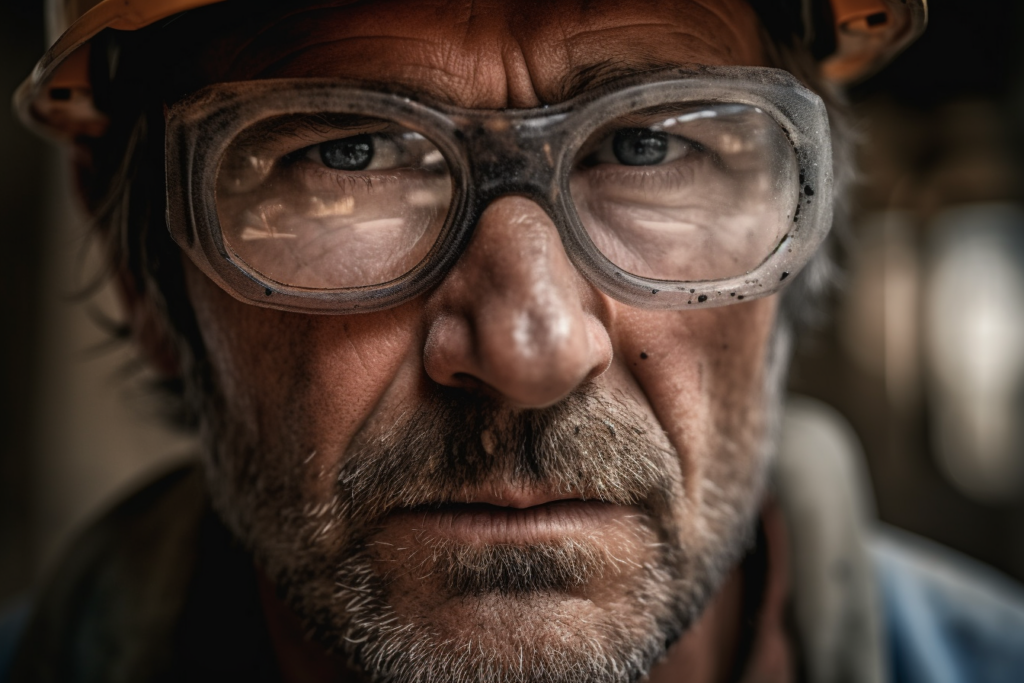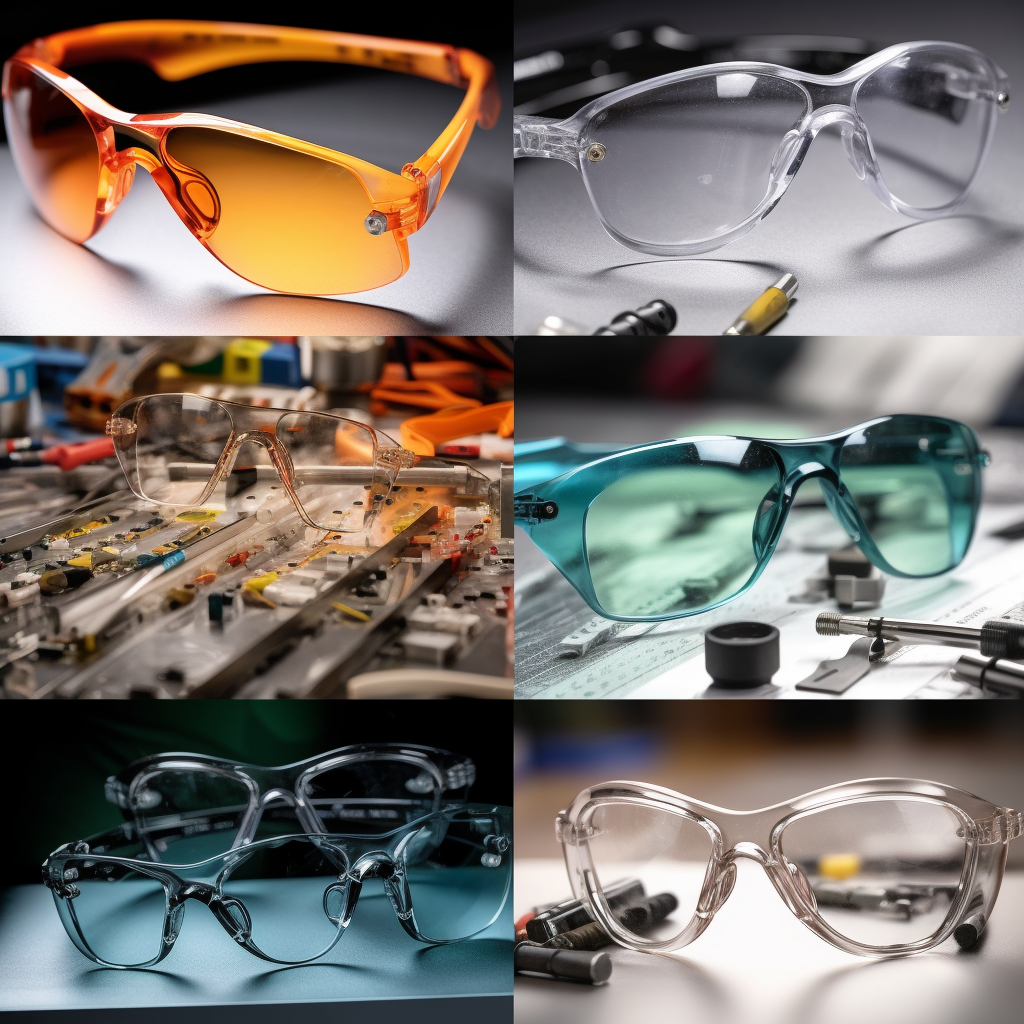Safety Glasses
Safety Glasses: Protecting Your Eyes in Diverse Work Environments
In today’s fast-paced industrial world, eye protection is a must-have for workers in various sectors. From manufacturing to healthcare, and from education to building services, safety glasses are the primary solution to safeguard employees’ eyes. This comprehensive guide will delve into the different types of safety glasses, their scientific background, industry applications, and tips for choosing the right pair for your specific needs.
In This Article
Understanding Different Types of Safety Glasses

- Clear lens safety glasses provide general eye protection against dust, debris, and other hazards. They are ideal for indoor use or in low-light conditions where visibility is crucial.
- Tinted lens safety glasses are designed for outdoor use or well-lit environments, offering protection against glare and sunlight. These glasses help reduce eye strain and fatigue, especially for workers who spend long hours in bright settings.
- Anti-fog lens safety glasses are specifically engineered to prevent lens fogging in humid or high-temperature environments. They ensure clear vision and minimize the need to remove glasses for cleaning or defogging.
- Polarized safety glasses reduce glare and eye strain by filtering out intense light and reflections. They are particularly useful for workers in water or snow environments, or those who handle reflective materials.
- Prescription safety glasses cater to employees with vision needs, combining the required corrective lenses with safety features for a complete eye protection solution.
- Bifocal and reading safety glasses merge protection and magnification, allowing workers to see small details and perform tasks that require close-up focus without needing to switch between safety glasses and reading glasses.
By understanding the various types of safety glasses available, you can make an informed decision on which pair best suits your needs and work environment.
The Science Behind Safety Glasses

Safety glasses are engineered to offer maximum protection while maintaining comfort and style. To achieve this, they incorporate various advanced materials and technologies:
- Material composition: Polycarbonate, Trivex, and NXT are the three primary materials used in safety glasses. Polycarbonate is a lightweight, impact-resistant plastic that provides excellent protection against high-velocity impacts. Trivex is a newer material with similar properties to polycarbonate, but it offers higher optical clarity and better resistance to chemicals. NXT is a premium material that combines the best features of both polycarbonate and Trivex, offering superior impact resistance, optical clarity, and chemical resistance.
- Resistance to impact and shattering: Safety glasses are designed to withstand impacts from flying debris, tools, and other workplace hazards. Their lenses should meet or exceed the impact resistance standards set by the American National Standards Institute (ANSI) to ensure adequate protection.
- UV protection: Prolonged exposure to harmful UVA and UVB rays can cause significant damage to the eyes. Safety glasses with UV protection block these harmful rays, shielding your eyes from potential long-term damage.
- Lens coatings: A variety of lens coatings are available to enhance the performance and durability of safety glasses. Scratch-resistant coatings prolong the life of the lenses, while anti-glare coatings reduce reflections and improve visibility. Hydrophobic coatings repel water, helping to keep lenses clear in wet conditions.
Industry Applications

Safety glasses play a pivotal role in a wide range of industries, offering tailored protection to suit specific work environments:
- Manufacturing and distribution: Workers in these sectors often face hazards such as flying debris and exposure to chemicals. Safety glasses shield their eyes from these dangers, ensuring they can perform their duties safely and effectively.
- Healthcare: Medical professionals require protection from biohazard splashes, laser hazards, and other risks present in healthcare settings. Specialized safety glasses provide the necessary barrier to keep their eyes safe while they care for patients.
- Education: Science labs and technical courses often involve chemicals, heat, or other hazards that pose a risk to students and teachers. Safety glasses serve as a vital safeguard, allowing participants to focus on learning without fear of eye injury.
- Building services: Workers in the building services industry are exposed to dust, wood, and metal particles that can cause serious eye injuries. Safety glasses provide essential protection, ensuring that these professionals can carry out their tasks safely and efficiently.
By selecting the appropriate safety glasses for your industry, you can significantly reduce the risk of eye injuries and maintain a safe work environment.
Tips for Choosing the Right Safety Glasses
Selecting the perfect pair of safety glasses involves several factors, including assessing workplace hazards, evaluating lens materials and coatings, and ensuring a proper fit. Follow these tips to make an informed decision:
- Assess workplace hazards: Begin by identifying the specific eye protection needs of your work environment. Consider factors such as exposure to debris, chemicals, UV rays, and glare to determine the ideal safety glasses for your tasks.
- Evaluate lens material and coating options: Based on your workplace hazards, choose a lens material that offers the right balance of impact resistance, optical clarity, and chemical resistance. Additionally, consider lens coatings to enhance the performance and durability of your safety glasses.
- Ensure proper fit: A comfortable, secure fit is vital for both safety and comfort. Look for safety glasses with adjustable features, such as nose pads and temple tips, to achieve a customized fit. Additionally, ensure that the glasses are compatible with other personal protective equipment (PPE) you may need to wear, such as helmets or earmuffs.
- Consider style preferences: While safety is paramount, style preferences should also be factored into your decision. Select a frame design and lens color that complements your personal taste, making you more likely to wear the glasses consistently.
- Budget constraints: Quality and affordability must be weighed when choosing safety glasses. Invest in the best pair that fits your budget, prioritizing essential safety features while finding a balance with style and comfort.
Proper Usage and Maintenance of Safety Glasses

To ensure the continued effectiveness of your safety glasses, adhere to the following usage and maintenance guidelines:
- Regularly inspect for damage: Examine your safety glasses for scratches, cracks, or other damage that could compromise their protective capabilities. A damaged pair may not offer the same level of protection and should be replaced promptly.
- Clean lenses regularly: Keep your lenses free from dirt, smudges, and fingerprints to maintain optimal visibility. Use a soft, lint-free cloth and a suitable lens cleaner to gently clean the lenses.
- Store safety glasses in a protective case: When not in use, store your safety glasses in a protective case to shield them from damage and prolong their lifespan.
- Train employees on proper use and care: Educate your team on the importance of eye protection and instruct them on the correct usage and maintenance of their safety glasses. This will ensure that they get the most out of their protective eyewear and remain safe while on the job.
By caring for your safety glasses and using them correctly, you can maximize their effectiveness and extend their life, ensuring optimal eye protection in your work environment.
Regulatory Aspects of Safety Glasses
Compliance with safety regulations is crucial when selecting safety glasses for your workplace. Keep these regulatory considerations in mind:
- OSHA regulations and ANSI standards: The Occupational Safety and Health Administration (OSHA) enforces regulations for safety eyewear, and the American National Standards Institute (ANSI) sets performance standards for protective eyewear. Ensure that your safety glasses meet or exceed ANSI Z87.1 standards, which guarantee adequate impact resistance and lens quality.
- Industry-specific guidelines: Some industries have additional guidelines for safety glasses, such as the medical field and its requirements for laser protective eyewear. Be aware of any specific regulations applicable to your industry and choose safety glasses that comply with these standards.
- Importance of choosing certified safety glasses: Selecting safety glasses with proper certifications is essential to ensure your eyes are adequately protected. Certified glasses have undergone rigorous testing and meet established safety standards.
- Regular safety audits and evaluations: Conduct regular safety audits to assess the effectiveness of your eye protection program and identify areas for improvement. This will help maintain a safe work environment and ensure compliance with safety regulations.
Different Brands of Safety Glasses

When selecting safety glasses, it’s essential to consider the reputation and offerings of various manufacturers. Some top brands in the safety eyewear industry include:
- 3M: A global leader in personal protective equipment, 3M offers a broad range of safety glasses with innovative features and a focus on comfort and style.
- Honeywell: Known for its commitment to safety, Honeywell provides a variety of safety glasses designed for various industries and applications, from basic protection to specialized eyewear.
- Bolle: Bolle is a popular brand in the sports eyewear market and has expanded its offerings to include safety glasses with advanced lens technology and stylish designs.
- Uvex: A pioneer in the safety eyewear industry, Uvex offers a wide selection of safety glasses, including models with advanced lens coatings and materials to enhance performance and durability.
Compare the features, styles, and price points of these leading brands, and review customer feedback and testimonials to make an informed decision. Explore online and local sources for purchasing safety glasses to find the best deals and availability.
The critical role of safety glasses in protecting your eyes cannot be overstated. As you navigate the diverse work environments of manufacturing, healthcare, education, and building services, it’s crucial to actively consider eye safety and make informed choices when selecting safety glasses. By following the tips and insights provided in this comprehensive guide, you can ensure that your eyes remain protected and comfortable, allowing you to focus on your tasks with confidence and peace of mind.
Frequently Asked Questions (FAQ)
At IP Products, we offer a wide range of safety glasses to meet your needs. Browse our collection today and find the perfect glasses for your job. We are dedicated to quality, customer satisfaction, and fast shipping.

